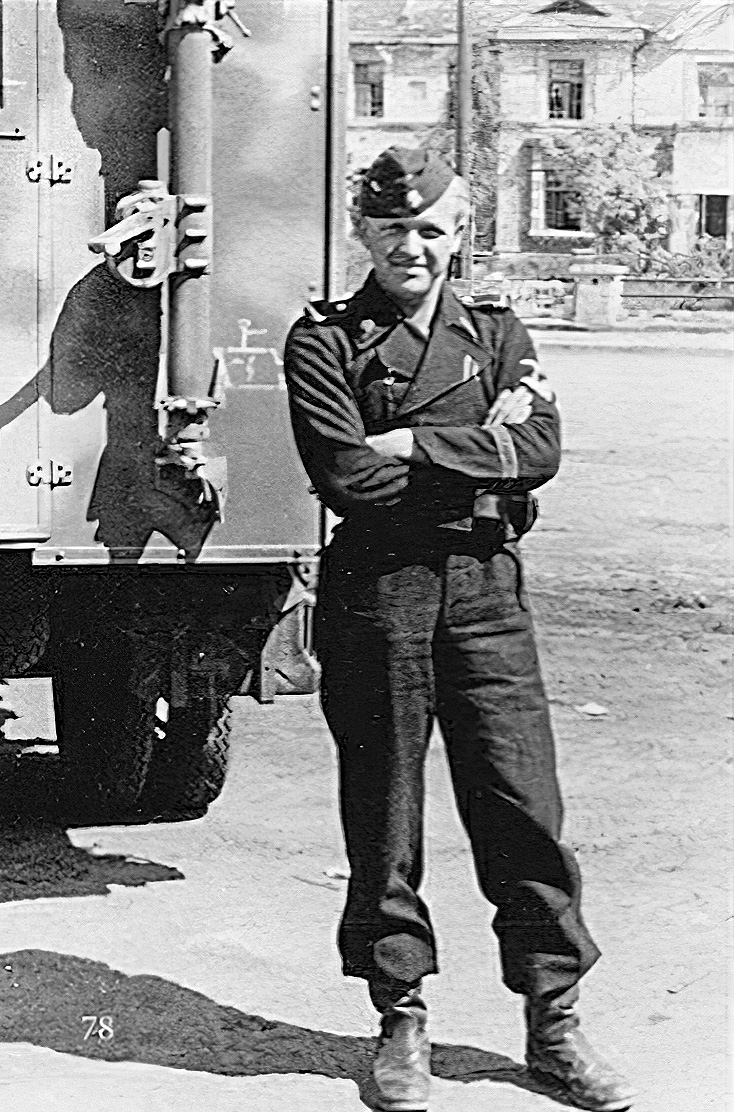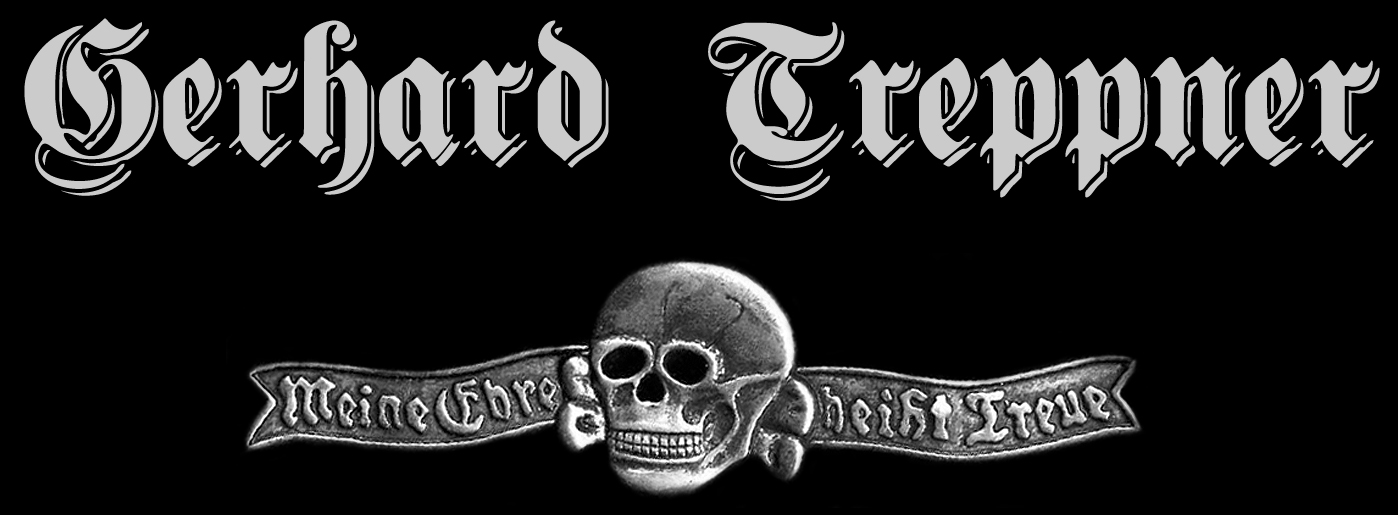
Interview with Gerhard Treppner, veteran of the feared SS-Panzerdivision 'Totenkopf'. Ulm, Germany, 1990.
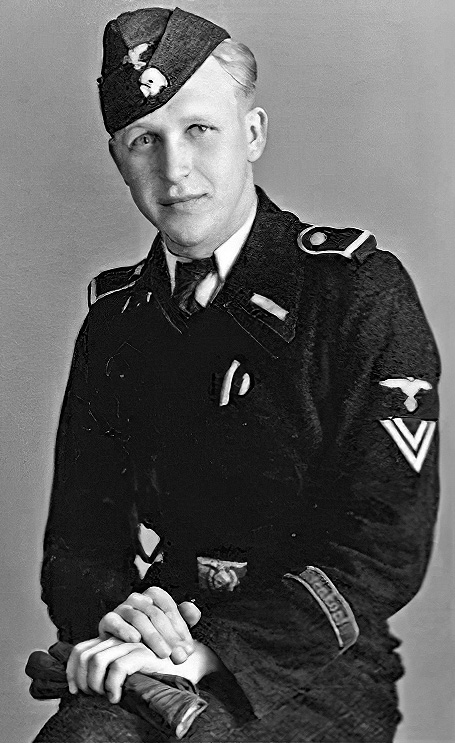


Interview with Gerhard Treppner, veteran of the feared SS-Panzerdivision 'Totenkopf'. Ulm, Germany, 1990.


Gerhard: It is quite simple really, Germany was at war and all young, fit men had to serve the nation in some form. I chose to volunteer instead of being drafted and friends had already gone before me. I chose to enlist in the former Waffen-SS and liked communications; I was accepted and then sent to training.
The Totenkopf Division took me in and sent me to the radio school at Nuremberg. From there I was posted to the Panzer regiment of the division and issued the black uniform. It was seen back then as a very elite status, to be in the Panzers was likened to the knights of old. The new steed was the Panzer.
I joined the communication battalion and would send orders to the Panzers. I even rode in the command Panzers a few times.
What type of Panzers did the regiment have?
Gerhard: We started off with the Panzer III, then upgraded at the Panzer grounds to the long barrel. Then in 1943 we received the new Tiger which the enemy feared and gave much respect to. Remember I was in the communications battalion; we rode around in our comfortable Opel trucks.
I was able to see all the Panzers, like the Panzer I, II, III, IV, and VI. The final was the King Tiger which was a huge monster and put the fear of our weapons into our enemies. Our problem was we had too few of the better Panzers where our enemies had unlimited supplies.
Our regiment would knock out a battalion and three more would be put into the battle line. I saw the aftermath of many of the battles and it is no exaggeration to say we would have a 10-1 kill ratio many of the times. Our Panzer regiment would receive many battle honors and be mentioned in the Wehrmacht reports.
What was your first action as part of the division?
Gerhard: That was in Russia during the battles for Kharkov, we were part of the wing that held off Ivan's counter thrusts to retake the city. It was one of the biggest battles and victories for the Waffen-SS and the Panzer arm. We faced a very determined and superior enemy, but through sheer will we beat them back.
I can remember that it was very cold that winter, the second of the war in the east. It was not as bad as the first as we were much better prepared for this one. We learned many lessons from that first winter where I was told some units went without any warm clothing [It is important to point out a grave misconception, no doubt a lie built by the enemies of truth, that Adolf Hitler had something to do with not supplying the troops on the eastern front with warm clothing. If you do your research you will find that it was actually traitors within the department of the Wehrmacht which dealt with their supplies. They INTENTIONALLY withheld warm clothing! The level of evil and treason is just unimaginable.-Ed.]
I remember at home the drives that were collecting and rushing items to the front. That had to be a great embarrassment to the planners and supply depots.
The winter I was in went very smooth for us. We still had control of the sky so we could be in the open for the most part. Of course precautions had to be taken as Ivan did show up now and again. You could hear them sometimes in these planes that sounded like a small engine, and then they would cut the power and fly silently to drop a bomb or two on us.
During the fighting for Kharkov our Luftwaffe still ruled the skies and I witnessed a few Ivans getting shot down. The planes would fly over us waving their wings to say hello to us. During this battle I was able to go to the battle line and see my first knocked out T34 which was still warm I remember, from burning.
I remember going into the city and surrounding villages after it was all over. The civilians were starting to return to take stock of what was lost. We settled into a quiet sector after the city fell and did further training and maintenance. I made it a point to know comrades in each of the different units.
I was told you can never have too many friends in a war; they can do things for you. I learned to trade for food and supplies, even with the Russian civilians. We had many Russians who came to work for us, I remember two of them from that time, Magda and Nonna, who would cook and clean for the regiment.
These were not captives and they were not forced to work, they came to us as willing helpers who did not like Stalin and wished us well in our fight. That winter was very good for me, except the fighting in the beginning. Our unit only faced light reconnaissance in force thrusts and not much else.
My battalion was able to enlist the help of a family we stayed with, the wife would cook food we brought them and the husband who was badly wounded in 1941 was a cripple whom would offer to sew our uniforms if needed. We always made sure they had plenty of food and firewood to keep warm and satisfied.
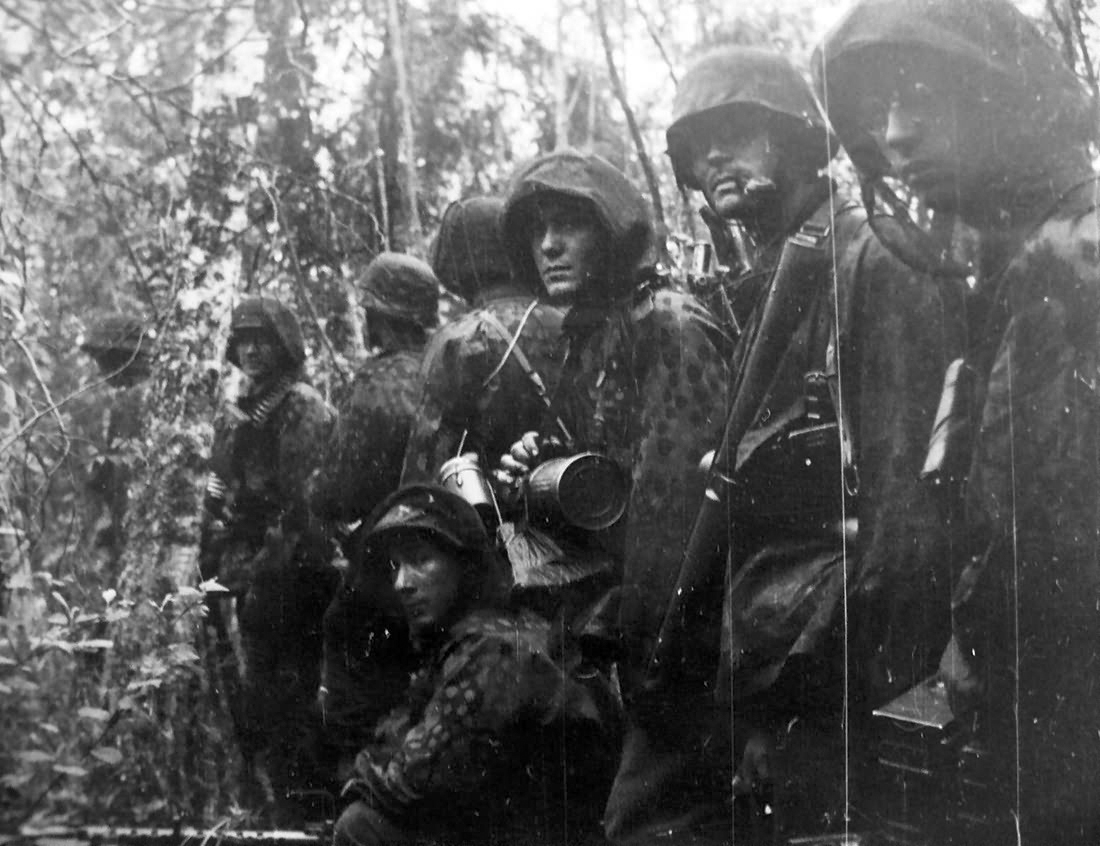
[Above: Tired knights of the Totenkopf Division.]
Gerhard: Yes, the regiment was sent into the battle for Kursk in the summer of 1943. We were moved out of our winter billet and sent to the front for action and training. We received new equipment and vehicles which our maintenance unit was kept busy painting and upgrading.
In this battle we needed to break through Ivan's lines and surround them, so they could be destroyed. If this would have worked we would have won in the east. I know from comrades that Russia was in a bad way by 1943. There were mass desertions to us, and new units being raised to fight Stalin.
We had some of these units alongside us to guard our flanks and they fought to the last often. They knew if they were captured they faced certain death. I do believe every one of them who made it to the end of the war and captured were executed on Stalin's order. The western allies returned them to Stalin after the war, and they were all shot from what I have heard.
Let me get back to Citadel, we attacked very well prepared lines and did achieve breakthroughs of many km and forced the Russians to either retreat or to commit their reserves. I saw the many air battles as well, and Ivan had gotten more strength in the air, but the Luftwaffe still gave a good account. I would see many Ivans come down and only a few of ours.
As the battle wore on I remember we had a feeling that we were locked in a great battle and victory was just a thread away.
We advanced into the rear of the enemy and he had nothing to hit us back with. Our losses were great I must say, but we had reserves to put in, they seemed not to.
I was part of the thrust for Prokhorovka which resulted in a great battle of armor in which I could see the smoke from hundreds of burning wrecks, most being from the [Soviet] Guards Army. I had binoculars and could see nothing but littered fields with hulks of vehicles of every sort. This slowed our attack, but we still went forward.
I understand today that not all parts of the battle were going well, but in our area of operation it seemed we had beaten a large colossus who was knocked down. All that was needed was that final thrust of the sword and it would be over. However fate intervened in a cruel way.
The Allies landed in Italy and the king decided to end the war and side with his enemies. To halt this, Citadel was pulled back and key Panzers were pulled out and sent to a new front. This gave Ivan key time to rest and put in newly arrived reinforcements that came from far away.
When this happened the gains we made had to be given back as we were forced to pull back to avoid being trapped. We took many prisoners still, as many believed Russia was about to give in. Stalin moved political officers into the ranks at this stage and they quickly took things in hand. Anyone who seemed defeatist was sent away or shot, we noticed the desertions dried up almost overnight.
We even faced counterattacks right after as well, they wanted to rebuild lost morale. As we had been much weakened, some of these attacks were repulsed with the greatest mental effort. It was at this time I can tell you I lost faith in the final victory. From what I was reading, and what I saw, I knew the superiority of the enemy could not be broken, even with the best weapons.
We again were sent back into action to repulse new attacks from a foe who had received a new lease on life. From then on we faced a growing monster, who now was fielding all the call-ups from the previous year that were now out of training. The momentum now went to Ivan and he took full advantage.
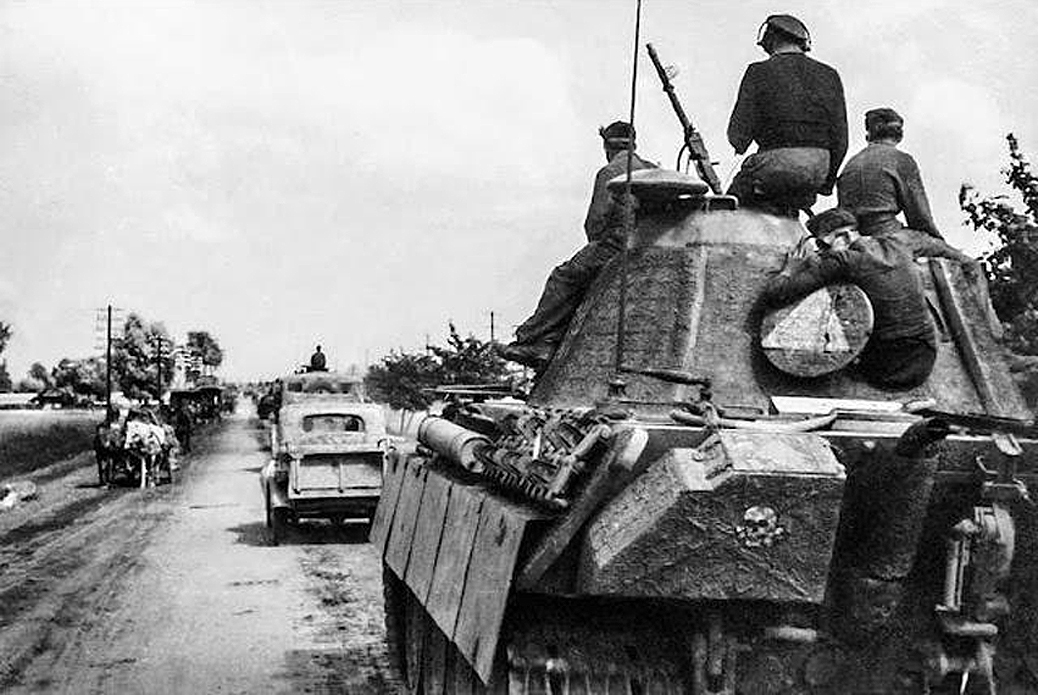
[Above: A tank of the Totenkopf Division. Note the death's head painted on the back of the tank.]
I would like to ask how you, being an SS man, viewed both the Russian soldier and the Russian civilians.
Gerhard: I can honestly tell you I had respect for both. We knew the average Russian did not ask for war, and did not want to fight us. The war in the east was a war of ideology and nothing more. It was National Socialism against International Bolshevism; it was a war that would have been fought sooner or later.
Hitler just pulled the first punch to try to catch Stalin napping before he could move west. I firmly believe that was what Stalin had in mind, of course he denied it and followed the same line the western allies did, and that Hitler was Napoleon and wanted to rule the world.
I found that many Russian civilians did not believe that and hated Stalin. Many, as I said, came to help Germany. I saw in the winter of 1941 and spring of '42 many Russians who were welcomed into the Reich and General Government [Poland]. You could go to many places in the east and see them in temporary housing.
Germany took care of many refugees during that time, I saw several instances of this and mercy was shown at all times. The Red Cross, welfare office, and other German agencies were tasked with helping the countless who sought food and shelter in the east. When we would pass through a town the children would flock to us.
They either begged, or looked to make money shining boots or cleaning out the cattle cars we rode in. The women would offer cooked goods for sale; I once traded cigarettes for a berry pie for the car I was riding in. We each got a small bite and I was quite impressed with the taste.
Some women did bad things for money, which was actually forbidden to do, but some men's urges were too great to hold back I guess. If they were caught it was punishment for both. Our spies told us the reason why Russian women were off limits is we did not want it to be seen like we were forcibly taking women as trophies.
I personally saw many German soldiers with Russian or Ukrainian girlfriends, they would come and give kisses at the train station when we had to report back to duty, or they would come to where we billeted, secretly of course.
For Ivan, I would say he was a worthy foe, they beat us in the end so they were no pushovers. They fought hard and bravely in my mind and could be just as deadly as we could be. I must say they could be cruel, which I feel is well documented but ignored by today's journalists.
In the end they proved to be corrupt and full of hate which they took out on us, the towns that felt their hate were never the same.
I know I have read that German forces were very cruel to the Russians, so they claim they were only repaying for German crimes. The Einsatzgruppen and partisan hunters are said to have killed millions of civilians. I have read that many former veterans have agreed with these accusations, thus proving German guilt. I know you disagree but can I ask why?
Gerhard: It's complicated my young one. Yes I am aware of the accusations, and to make it worse some comrades and former veterans have agreed with what our former enemies have said about that time. I can try to explain my point of view to see if it might make sense.
After the surrender the Allies went immediately to work on justifying the war, and great loss of life and culture. If someone wanted to have any type of future postwar you could not rock the boat. The war guilt the Allies pushed on us was vast. They blamed Germany for being aggressive, starting the war, bombing cities, killing civilians, killing Jews, and abusing occupied areas.
This is hard on any peoples to endure and Germans were already traumatized from six years of war. It just made no sense to defend Hitler or Germany's policies in the post war era. Everyone just wanted to move on and rebuild what was lost. We dared not forget our fallen, but the war was over. We only wanted to forget the horror.
Of course for those who willingly helped the Allies go after their own comrades, they can be put into two camps, the opportunists and the fearful. Those who were opportunists only wanted to make a name for themselves, so they concocted or allowed themselves to be coached regarding crimes.
They would tell authorities that they saw something that was being investigated and then they lied about who, why, or what. Even the Allies could smell some of them out, as they were very outlandish. Some TV shows use these people to this day, spewing total falsehoods. They make up wild claims of children and other innocents being shot down, all for a political favor or their spot in the limelight.
The fearful also can be prone to lie, and there is a German fairy tale to explain this. A temptress was going to be executed by a king, but she was clever. She knew he liked to hear stories so she asked if she could tell him a story before he had her killed. The king agreed to this.
Her story was very good and made him want more. The next night she came to him with another story which was equally as good, so he agreed to let her live another day. She was able to keep this going for awhile and eventually she proved her worth to the king who gave up on wanting her to die. She was able to save her neck by telling stories the king wanted to hear.
Like this, many Germans were able to stay alive and out of prisons by agreeing with claims the Allies made and adding to them. It is a basic feeling to want to be safe and with family. If that meant making up a story then it is understandable why many did this.
It has poisoned the well of justice, so to speak, if German soldiers did commit crimes in occupied areas it now is impossible to seek to prove or disprove claims because in my mind many of the attestations I believe are false and made up. I can give you an example I know of.
In France a little girl fell out of a high window and hit the brick below, breaking her neck and dying. German soldiers tried to help revive her but after the war the story told to French investigators was German soldiers killed her. The media ran with this story, and it was only after a relative came out to say she fell in an accident that it was dropped.
The damage was done. I feel this type of thing happened all over the occupied areas, they were war zones and subjected to bombings and strafing. Even in war zones civilians can get caught up and become victims. I fear this happened much more often than the Allies wish to admit. I was in France and saw a lot of damage from Allied bombs.
There were reprisals I know, but the Waffen-SS did not do these, they were handled by the police battalions and partisan hunters, many of whom were foreign. I do not wish to get into that with you as it is not within my scope to address and quite frankly I am appalled at the stories, if in fact they are true. They as well need further study and investigation.
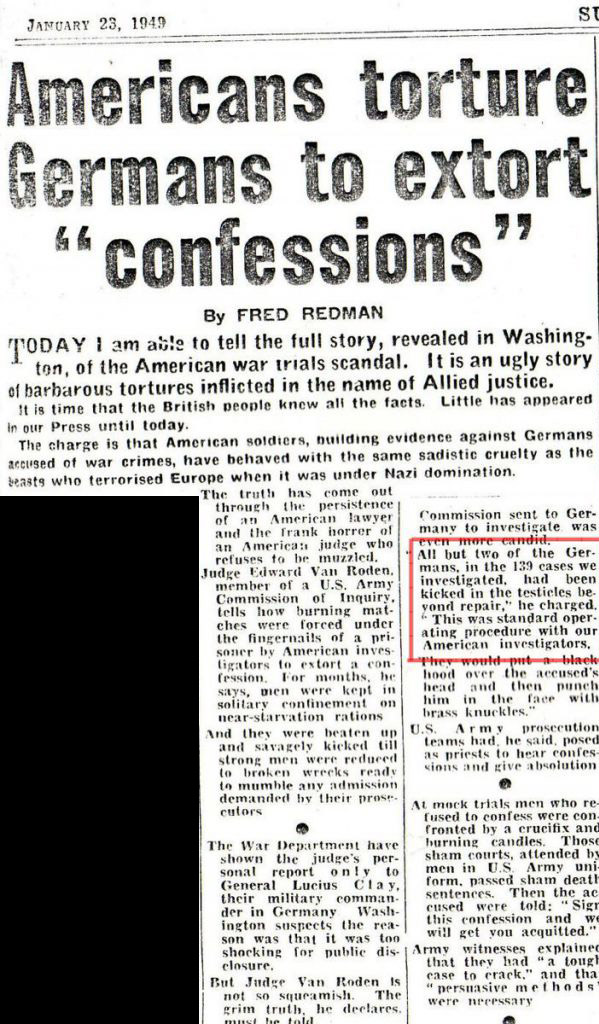
[Above: Gerhard Treppner didn't mention another facet of Allied lies: forced confessions. As the article above states:
Furthermore:
[The US Simpson Inquiry Commission] reported among other things that of the 139 cases they had investigated, 137 had had their testicles permanently destroyed by kicks received from the War Crimes Investigating Team.
'All but two of the Germans, in the 139 cases we investigated, had beeen kicked in the testicles beyond repair,' he charged. 'This was standard operating procedure with our American investigators.'
'Documented torture of German POWs before the Nuremberg trials:
Pennsylvania judge Edward L. Van Roden - member of the commission investigating the accusations by Colonel Everett who reported that Germans did not receive fair trial, wrote in his book titled "American Atrocities in Germany":
Our investigators would put a black hood over the accused's head and then punch him in the face with brass knuckles, kick him, and beat him with rubber hose. Many of the German defendants had teeth knocked out. Some had their jaws broken. All but two of the Germans, in the 139 cases we investigated, had been kicked in the testicles beyond repair.']
Do you believe the SS or German forces are guilty of committing war crimes?
Gerhard: I am not sure where I stand on the whole issue. I know the Totenkopf Division has been accused of many criminal acts and I was not part of the early unit. I personally do not have much faith in what our former enemies say about our conduct. It would be like me writing the life story of my worst enemy, how objective would I be?
If it comes down to did our soldiers at times shoot surrendering soldiers? Or maybe abuse a POW? I suppose that could be possible, however, I know there was punishment for anyone violating the conventions of war, and I saw Ivan treated very well. As I told you, we had many who worked right in our midst, we called them Hiwis [Hiwi is from the German abbreviation of the word Hilfswilliger, or in English 'auxiliary volunteer'].
I never saw anyone being abused or harassed by a member of our regiment, so to me we have clean honor.
I have seen phone equipment that says "Feind hort mit", can I ask what that means and why was it on mics and phones?
Gerhard: Ahh, it simply means 'the enemy is listening'. In communications that are without wires, it was easy to pick up radio waves and frequencies. The enemy could tap into a frequency at any given time, so we spoke in code to deceive and confuse them.
There would be funny names given to units, equipment, or leaders. Such as 'Drum Beat to Christmas Tree, over. The sausage is simmering in the soup, receive the salt pronto.' That could mean a hot spot needed a unit sent now to reinforce. We had all sorts of funny names and terms we used back then.
Anyone hearing us talk always laughed at us as they had no clue what we spoke of, it would sound as if it was another language, which in a sense it was. Those were the days for me and my comrades.
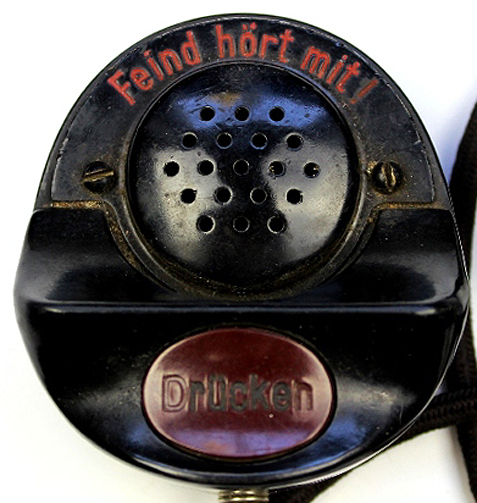
[Above: The enemy is listening!]
What did the SS mean to you as an arm of the NSDAP and Himmler's ideas?
Gerhard: I really never saw any of the indoctrination that maybe some early Old Guard had. Much of what I learned about the SS was reading pamphlets and newspapers. I can say that in the spirit of what I know of the SS, aside from being the Führer's guard, it was a defender of Germanic blood.
In this I mean that only Germanic people can have Germanic babies. Himmler created a movement within a movement to safeguard a certain bloodline. There was nothing sinister or evil about this, it was a race ensuring its existence in the world. Then the war came and the SS was forced to field its best blood.
I can tell you that during the war the effort was to just survive and all the racial rebuilding was put on the shelf. Of course we eventually fell and then our opinions became very unpopular and unimportant. Surviving in the post war era was the new watchword for all of us.
We returned to a land under occupation and you had to follow what the new rulers said or you got trouble. Our views and beliefs were a liability, even today, so no one dares to bring up the past in a way that glorifies our worldview or the truth of what we fought for. For in my opinion, we fought for a better world in which the greedy did not prosper.
That in essence is the SS worldview, to promote the existence of healthy blood and to live as a united community where everyone has a duty to each other. There is no one over the other, a focus of comradeship and community was our watchword.
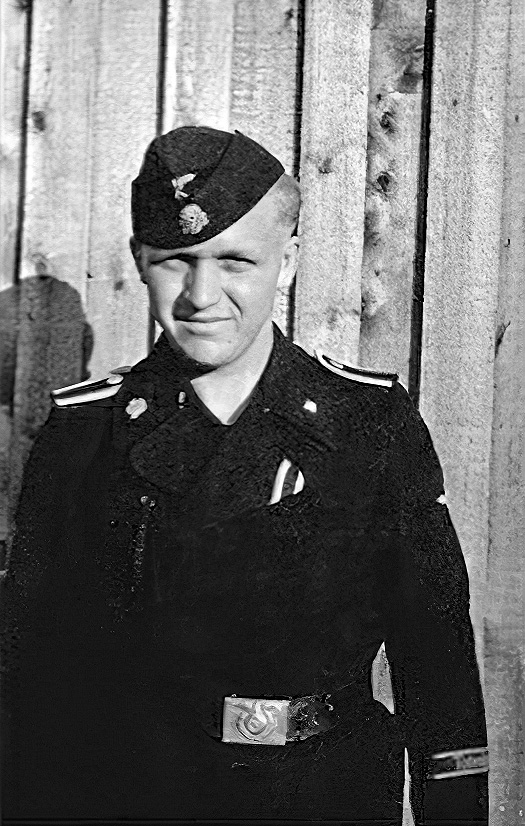
[Above: Gerhard Treppner.]
[Above: Gerhard Treppner.]